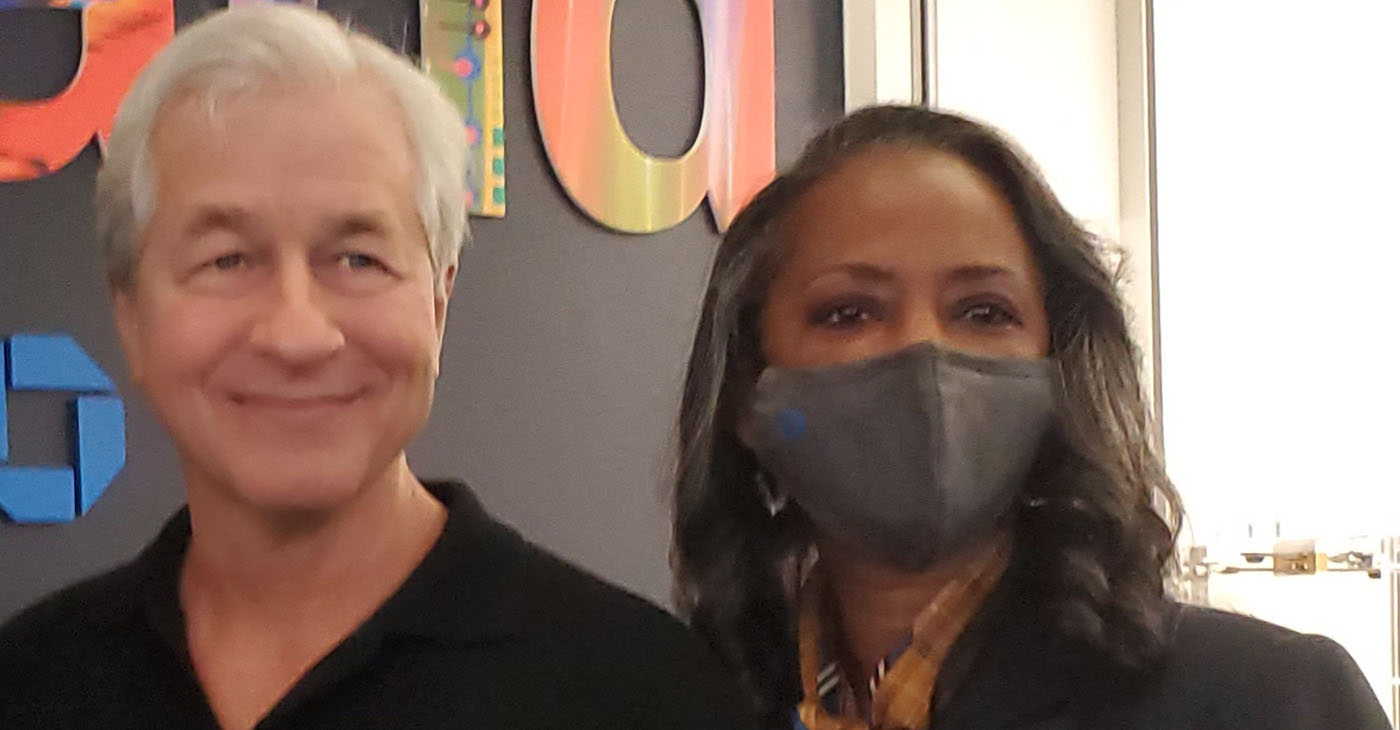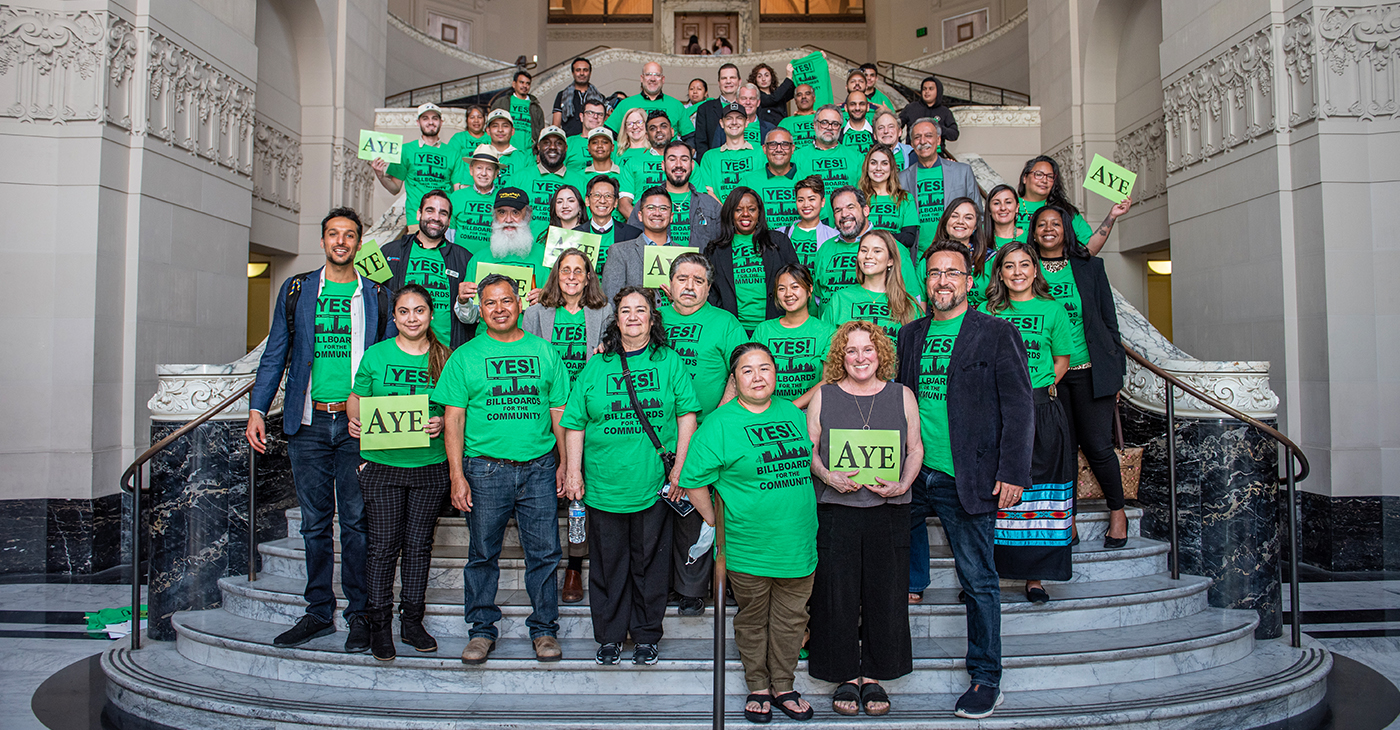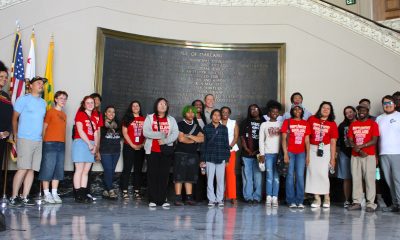Business
Chase Community Branch to Empower Black and Brown Start-Ups
During the ribbon cutting ceremony before an audience of about 40 people, JPMorgan Chase CEO Jamie Dimon addressed executive staff members of Chase from various regions in California along with local staff and community members. For Dimon, community banks represent the changes he hopes to see in the world for future generations. Dimon also said the George Floyd murder and the pandemic shed light on the racial disparities in communities of color. “Disparities are not something we were unaware of, but it did spotlight the need to do more.”

By Carla Thomas
On Dec. 8, JPMorgan Chase & Co. celebrated the grand opening of an innovative bank branch experience in downtown Oakland.
With a mission to help more Black and Latino start-ups and small businesses, the new Community Center branch will provide Oakland residents with financial tools and resources, including access to funding, mentoring and pop-up space for entrepreneurs.
Located at 3005 Broadway, the site is the first of its kind in Northern California, and only one of 12 among Chase’s nearly 5,000 branches nationwide.
“This is all about Oakland,” said branch manager Latanya Millican, who has served Chase for nearly 30 years. “This is a celebration of reaching our community with resources beyond traditional banking. At our branch, clients will be welcomed with opportunities to launch their business, expand their business, and secure closing costs on homes in addition to our traditional banking services.”
During the ribbon cutting ceremony before an audience of about 40 people, JPMorgan Chase CEO Jamie Dimon addressed executive staff members of Chase from various regions in California along with local staff and community members.
For Dimon, community banks represent the changes he hopes to see in the world for future generations. Dimon also said the George Floyd murder and the pandemic shed light on the racial disparities in communities of color. “Disparities are not something we were unaware of, but it did spotlight the need to do more.”
For Dimon, ‘more’ includes offering $5,000 homebuyer grants to help cover closing costs and down payments and increasing affordable housing and home ownership by providing $300 million in construction, permanent loans, and low-income housing tax credits over the past five years.
In 2020, the company committed to a $75 million, five-year investment in Oakland and San Francisco through long-term, low-cost loans and philanthropy to provide more affordable housing, and protect local residents from displacement.
“Our firm has committed $30 billion to advance racial equity and drive economic opportunities for Black, Latino and Hispanic communities, and the new centers are designed to accelerate minority, small-business growth in the country,” said Dimon.
“He’s like the modern-day Robin Hood,” said Betty Uribe, head of retail for California at Chase in describing Dimon.
Chase has also supported local organizations like the East Bay Asian Local Development Corporation (EBALDC) and The Unity Council and their mission of preserving affordable housing in Oakland neighborhoods with a $35 million loan through the Housing for Health Fund.
“We’re putting our communities first and this new hub will serve as a place where dreams are going to be hatched and brought to fruition,” Oakland Mayor Libby Schaaf said.
“After collaborating with my Chase Senior Business Consultant Nykole Prevost, myself and our director of operations were able to identify areas where the business can really impact our local communities on a faster timeline then we originally envisioned,” Derrick Hill, founder and president of Hill & Quality Associates, LLC, said.
Attendees also included Chase associates September Hargrove, Northern California director for Community Banking at JPMorgan Chase & Co.; Jonathan Morales, head of Community and Business Development for Chase in California; Nykole Prevost, senior business consultant, at Chase and Ben Walter, Chase Business Banking CEO.
Activism
Oakland Post: Week of July 24 – 30, 2024
The printed Weekly Edition of the Oakland Post: Week of July 24 – 30, 2024

To enlarge your view of this issue, use the slider, magnifying glass icon or full page icon in the lower right corner of the browser window. ![]()
Activism
Oakland Post: Week of July 17 -23, 2024
The printed Weekly Edition of the Oakland Post: Week of July 17 -23, 2024

To enlarge your view of this issue, use the slider, magnifying glass icon or full page icon in the lower right corner of the browser window. ![]()
Activism
Community Celebrates Historic Oakland Billboard Agreements
We, the Oakland Billboard Economic Development Coalition, which includes Oakland’s six leading community health clinics, all ethnic chambers of commerce, and top community-based economic development organizations – celebrate the historic billboard agreements approved last year by the Oakland City Council. We have fought for this opportunity against the billboard monopoly, against Clear Channel, for five years. The agreements approved by Council set the bar for community benefits – nearly $70 Million over their lifetime, more than 23 times the total paid by all previous Clear Channel relocation agreements in Oakland combined.

Grand Jury Report Incorrect – Council & Community Benefit
We, the Oakland Billboard Economic Development Coalition, which includes Oakland’s six leading community health clinics, all ethnic chambers of commerce, and top community-based economic development organizations – celebrate the historic billboard agreements approved last year by the Oakland City Council. We have fought for this opportunity against the billboard monopoly, against Clear Channel, for five years. The agreements approved by Council set the bar for community benefits – nearly $70 Million over their lifetime, more than 23 times the total paid by all previous Clear Channel relocation agreements in Oakland combined.
Unfortunately, a recent flawed Grand Jury report got it wrong, so we feel compelled to correct the record:
- Regarding the claim that the decision was made hastily, the report itself belies that claim. The process was five years in the making, with two and a half years from the first City Council hearing to the final vote. Along the way, as the report describes, there were multiple Planning Commission hearings, public stakeholder outreach meetings, a Council Committee meeting, and then a vote by the full Council. Not only was this not hasty, it had far more scrutiny than any of the previous relocation agreements approved by the City with Clear Channel, all of which provide 1/23 of the benefits of the Becker/OFI agreements approved by the Council.
- More importantly, the agreements will actually bring millions to the City and community, nearly $70M to be exact, 23 times the previous Clear Channel relocation agreements combined. They certainly will not cost the city money, especially since nothing would have been on the table at all if our Coalition had not been fighting for it. Right before the decisive City Council Committee hearing, in the final weeks before the full Council vote, there was a hastily submitted last-minute “proposal” by Clear Channel that was debunked as based on non-legal and non-economically viable sites, and relying entirely on the endorsement of a consultant that boasts Clear Channel as their biggest client and whose decisions map to Clear Channel’s monopolistic interests all over the country. Some City staff believed these unrealistic numbers based on false premises, and, since they only interviewed City staff, the Grand Jury report reiterated this misinformation, but it was just part of Clear Channel’s tried and true monopolistic practices of seeking to derail agreements that actually set the new standard for billboard community benefits. Furthermore, our proposals are not mutually exclusive – if Clear Channel’s proposal was real, why had they not brought it forward previously? Why have they not brought it forward since? Because it was not a real proposal – it was nothing but smoke and mirrors, as the Clear Channel’s former Vice President stated publicly at Council.
Speaking on behalf of the community health clinics that are the primary beneficiaries of the billboard funding, La Clinica de la Raza CEO Jane Garcia, states: “In this case, the City Council did the right thing – listening to the community that fought for five years to create this opportunity that is offering the City and community more than twenty times what previous billboard relocation agreements have offered.”
Oakland Billboard Economic Development Coalition
| Native American Health Center | La Clínica de la Raza | West Oakland Health Center |
| Asian Health Services | Oakland LGBTQ Center | Roots Community Health Center |
| The Unity Council | Black Cultural Zone | Visit Oakland |
| Oakland African American Chamber of Commerce | Oakland Chinatown Chamber of Commerce | Oakland Vietnamese Chamber of Commerce |
| Oakland Latino Chamber of Commerce | Building Trades of Alameda County | (partial list) |
-

 Arts and Culture3 weeks ago
Arts and Culture3 weeks agoRooted in Tradition: The Intricate History of Black Hair Braiding
-

 Bay Area4 weeks ago
Bay Area4 weeks ago“I Will Not Be Bullied,” Says Oakland Mayor Sheng Thao
-

 Bay Area2 weeks ago
Bay Area2 weeks agoPG&E Increases Rates While Bay Area Households Are Struggling to Stay Afloat
-

 Business3 weeks ago
Business3 weeks agoGov Newsom: Raising Fast Food Minimum Wage to $20 Pays Off as Jobs Multiply in Industry
-

 Activism4 weeks ago
Activism4 weeks agoOpponents of Mayor Sheng Thao Are Calling on Her to Resign Following FBI Raid
-

 Community1 week ago
Community1 week agoHundreds Come to Jehovah’s Witnesses’ Assembly Hall for Three-Day Program of ‘Good News’ in Fremont
-

 Bay Area2 weeks ago
Bay Area2 weeks agoJuneteenth Mass Shooting Suspect Charge with Multiple Counts of Felony Assault by Alameda County DA Pamela Price
-

 Activism4 weeks ago
Activism4 weeks agoOakland Coliseum Sale to AASEG: A Model for Community Development and Inclusion




















































